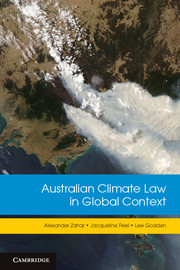Book contents
- Frontmatter
- Contents
- Acknowledgments
- Abbreviations and definitions
- Figures, tables and boxes
- Table of cases
- Table of statutes
- Table of treaties and other international instruments
- Introduction
- 1 Climate law
- 2 Legal elements and ongoing development of the international climate change regime
- 3 Measurement and verification of state emissions and legacy of the Kyoto Protocol’s compliance system
- 4 Development of climate law in Australia
- 5 Putting a price on carbon
- 6 The regulatory network of the Clean Development Mechanism
- 7 The emerging scheme for the protection of forests in developing countries (REDD)
- 8 Climate finance, technology transfer and capacity-building for sustainable development
- 9 Legal and regulatory frameworks for transition to a low-carbon economy
- 10 Biosequestration and emission reduction regulation in the Australian land sector
- 11 Adaptation to climate change through legal frameworks
- Postscript
- Bibliography
- Index
- References
7 - The emerging scheme for the protection of forests in developing countries (REDD)
Published online by Cambridge University Press: 05 December 2012
- Frontmatter
- Contents
- Acknowledgments
- Abbreviations and definitions
- Figures, tables and boxes
- Table of cases
- Table of statutes
- Table of treaties and other international instruments
- Introduction
- 1 Climate law
- 2 Legal elements and ongoing development of the international climate change regime
- 3 Measurement and verification of state emissions and legacy of the Kyoto Protocol’s compliance system
- 4 Development of climate law in Australia
- 5 Putting a price on carbon
- 6 The regulatory network of the Clean Development Mechanism
- 7 The emerging scheme for the protection of forests in developing countries (REDD)
- 8 Climate finance, technology transfer and capacity-building for sustainable development
- 9 Legal and regulatory frameworks for transition to a low-carbon economy
- 10 Biosequestration and emission reduction regulation in the Australian land sector
- 11 Adaptation to climate change through legal frameworks
- Postscript
- Bibliography
- Index
- References
Summary
Introduction: REDD’s place in the international climate regime
Forests have played a relatively minor role in the international climate regime to date. This is not because their value is questioned; on the contrary, it is clear that by sequestering carbon while standing, or releasing carbon dioxide when felled, forests and deforestation have significant effects on climate change.
The reason why forest-based mitigation has been very nearly excluded from the international regime has to do with the sheer practical difficulties involved, at every level, in any global effort to protect or augment the world’s forests. Action to overcome these difficulties has intensified in recent years within the frameworks provided by several international conventions focused on environmental protection. In this chapter we focus on efforts now being made, within the framework of the UNFCCC, to agree to a scheme for the reduction of emissions from deforestation and forest degradation in developing countries: the scheme known as REDD. While REDD is far from being finalised at the international level, much preparatory work is already under way, including demonstration projects (some sponsored by Australia) in anticipation of its establishment. REDD’s peculiar situation is that it is a regime with broad international support but with little international regulation yet in place. Nevertheless, it is sufficiently evolved to justify a separate chapter.
- Type
- Chapter
- Information
- Australian Climate Law in Global Context , pp. 229 - 254Publisher: Cambridge University PressPrint publication year: 2012



